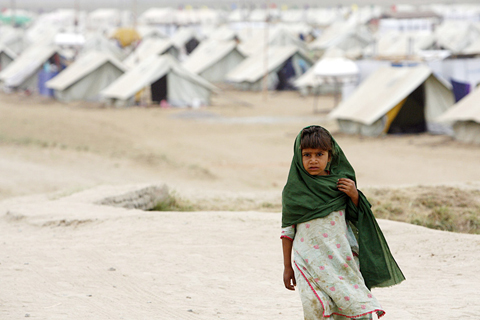Pakistani tribesmen avenging a mosque attack surrounded two militant strongholds and destroyed the homes of some Taliban commanders, an official said yesterday as the death toll in the fighting hit 13.
As many as 1,600 tribesmen have joined a citizens’ militia in Upper Dir district — an indication of rising anti-Taliban sentiment in Pakistan as the military pursues its offensive against the militant group in the nearby Swat Valley.
The militias, known as lashkar, were focusing on two villages known as Taliban strongholds, said Khaista Rehman, a local police chief. Officials said Sunday the tribesmen had managed to clear three other villages.

PHOTO: REUTERS
“An intense fight between the lashkar and the Taliban is still going on and the lashkar has destroyed 25 homes of Taliban commanders and their fighters in various villages,” Rehman said by phone. “The Taliban had set up their offices in those villages but the local residents and the lashkar have attacked them, and we hope the lashkar will succeed.”
The attack on the mosque on Friday left 33 worshippers dead and wounded dozens more during prayers, angering residents of the Haya Gai area of Upper Dir district, where minor clashes with local militants have occurred for months.
Including 11 militants killed over the weekend, the insurgent death toll reached 13 yesterday, senior police official Nawaz Khan said. Two tribesmen were wounded during yesterday’s fighting in the two villages.
The government has encouraged citizens to set up militias to oust Taliban fighters, especially in the regions that border Afghanistan where al-Qaeda and the Taliban have hide-outs. But villagers’ willingness to do so has often hinged on confidence that authorities will back them up if necessary.
With the army reporting advances against the Taliban in Swat — an operation that also reaches into Lower Dir district and has broad public support — that confidence appears to be growing.
Already, military officials say that as they’ve proceeded with the operation in Swat, local residents who have remained in the region have grown increasingly cooperative, providing tips on militants’ hide-outs and more.
The month-old Swat offensive, the latest round in a valley that has experienced fighting for two years, is seen as a test of Pakistan’s resolve to take on al-Qaeda and Taliban fighters on its soil.
The US hopes the offensive will eliminate a potential sanctuary for militants implicated in attacks on Western forces across the border in Afghanistan.
The military says more than 1,300 militants and 105 soldiers have died so far in the offensive, which has generally broad public support. The Taliban have threatened to stage suicide attacks in major Pakistani cities in revenge for the Swat operation.
Also yesterday, the leader of a Taliban faction at odds with Pakistani Taliban chief Baitullah Mehsud denounced Mehsud for staging attacks inside the country — a sign of rivalries within the collection of groups identified as the Taliban.
In an interview Qari Zainuddin urged tribal leaders to resist Mehsud and said his fighters would stay neutral if the army launches an operation in South Waziristan, Mehsud’s stronghold.

BLOODSHED: North Koreans take extreme measures to avoid being taken prisoner and sometimes execute their own forces, Ukrainian President Volodymyr Zelenskiy said Ukrainian President Volodymyr Zelenskiy on Saturday said that Russian and North Korean forces sustained heavy losses in fighting in Russia’s southern Kursk region. Ukrainian and Western assessments say that about 11,000 North Korean troops are deployed in the Kursk region, where Ukrainian forces occupy swathes of territory after staging a mass cross-border incursion in August last year. In his nightly video address, Zelenskiy quoted a report from Ukrainian Commander-in-Chief Oleksandr Syrskyi as saying that the battles had taken place near the village of Makhnovka, not far from the Ukrainian border. “In battles yesterday and today near just one village, Makhnovka,

The foreign ministers of Germany, France and Poland on Tuesday expressed concern about “the political crisis” in Georgia, two days after Mikheil Kavelashvili was formally inaugurated as president of the South Caucasus nation, cementing the ruling party’s grip in what the opposition calls a blow to the country’s EU aspirations and a victory for former imperial ruler Russia. “We strongly condemn last week’s violence against peaceful protesters, media and opposition leaders, and recall Georgian authorities’ responsibility to respect human rights and protect fundamental freedoms, including the freedom to assembly and media freedom,” the three ministers wrote in a joint statement. In reaction

BARRIER BLAME: An aviation expert questioned the location of a solid wall past the end of the runway, saying that it was ‘very bad luck for this particular airplane’ A team of US investigators, including representatives from Boeing, on Tuesday examined the site of a plane crash that killed 179 people in South Korea, while authorities were conducting safety inspections on all Boeing 737-800 aircraft operated by the country’s airlines. All but two of the 181 people aboard the Boeing 737-800 operated by South Korean budget airline Jeju Air died in Sunday’s crash. Video showed the aircraft, without its landing gear deployed, crash-landed on its belly and overshoot a runaway at Muan International Airport before it slammed into a barrier and burst into flames. The plane was seen having engine trouble.

REVELRY ON HOLD: Students marched in Belgrade amid New Year’s events, saying that ‘there is nothing to celebrate’ after the train station tragedy killed 15 Thousands of students marched in Belgrade and two other Serbian cities during a New Year’s Eve protest that went into yesterday, demanding accountability over the fatal collapse of a train station roof in November. The incident in the city of Novi Sad occurred on Nov. 1 at a newly renovated train facility, killing 14 people — aged six to 74 — at the scene, while a 15th person died in hospital weeks later. Public outrage over the tragedy has sparked nationwide protests, with many blaming the deaths on corruption and inadequate oversight of construction projects. In Belgrade, university students marched through the capital